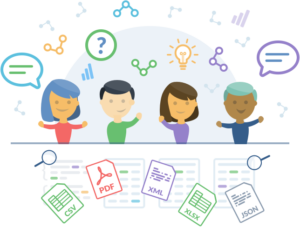Data journalism is becoming increasingly prevalent across media outlets worldwide. Local newsrooms are implementing the use of statistics, visuals, and other forms of data curation within their reporting. More J- schools are even incorporating digital literacy into their traditional curriculum. Data not only adds tangible assets to a reporter’s story, but it also provides readers with a sense of validity in an age when media distrust is not uncommon. The Data Journalism: We’re All Nerds Now panel at this year’s SXSW seeks to further explore the future of data journalism as well as ideas about removing remaining barriers for journalists, localizing, sharing, and finding stories in data, and more. In anticipation of the panel, we sat down with panel organizer and Marketing Director of data.world Ian Greenleigh.

Though his focus lies primarily in marketing now, Greenleigh has been a fan of data journalism since the term existed.
“I’ve been a fan of data journalism since there’s been a phrase for it. Our company got involved when we signed our first client, The Associated Press. We realized there was an opportunity to create a new model for distributing data especially when working with a news service like AP where they have a lot of customers around the world who may be interested in having data available for them to use in their stories, similar to the way they use AP stories.”
Greenleigh said data.world was able to create a model for media outlets like AP so they could “distribute localized data for the different market that their customers represent in a really streamlined, easy way.”
When asked about what characteristics define a ‘data journalist,’ Greenleigh said the term is encompassing of most journalists even if they don’t identify themselves that way.
“Anyone who uses data in their reporting, even if it doesn’t make it into the actual piece, but uses data to inform their reporting in any capacity is practicing some form of data journalism whether they label themselves as a ‘data journalist’ or not.”
Greenleigh also discussed the value of data journalism in an environment when there is often speculation about ‘fake news’.
 “Our own research has found that news consumers trust outlets more if they make the data portion of their reporting easy to get. Across the political spectrum—it doesn’t matter if you’re talking to someone who has a general distrust of the media or someone who’s more trusting of the media—the majority of people report they will trust an outlet more if the data behind their reporting is made available to them, ” Greenleigh said.
“Our own research has found that news consumers trust outlets more if they make the data portion of their reporting easy to get. Across the political spectrum—it doesn’t matter if you’re talking to someone who has a general distrust of the media or someone who’s more trusting of the media—the majority of people report they will trust an outlet more if the data behind their reporting is made available to them, ” Greenleigh said.
However, the Data Journalism: We’re All Nerds Now panel at SXSW will focus more specifically on the democratization of data journalism.
“More journalists than ever are able to participate in data journalism in the sense that they can use data in their reporting. Some of that is technological advancements in the tools they use. Some of that is because schools are teaching more data practices as part of their curriculum,” Greenleigh said.
He’s also looking forward to discussions about how data journalism is converging with other strains of journalism.
“I’m excited to talk about the relationship between data journalism and investigative reporting. I see more and more how data journalism is used to investigate deeper.”
To hear more about the ever-evolving world of data journalism, check out the Data Journalism: We’re All Nerds Now panel at SXSW 2018.
Saturday, March 10
11:00am-12:00pm
JW Marriott – Salon FG
More info: Data Journalism: We’re All Nerds Now
Feature Image: Daily Data News
